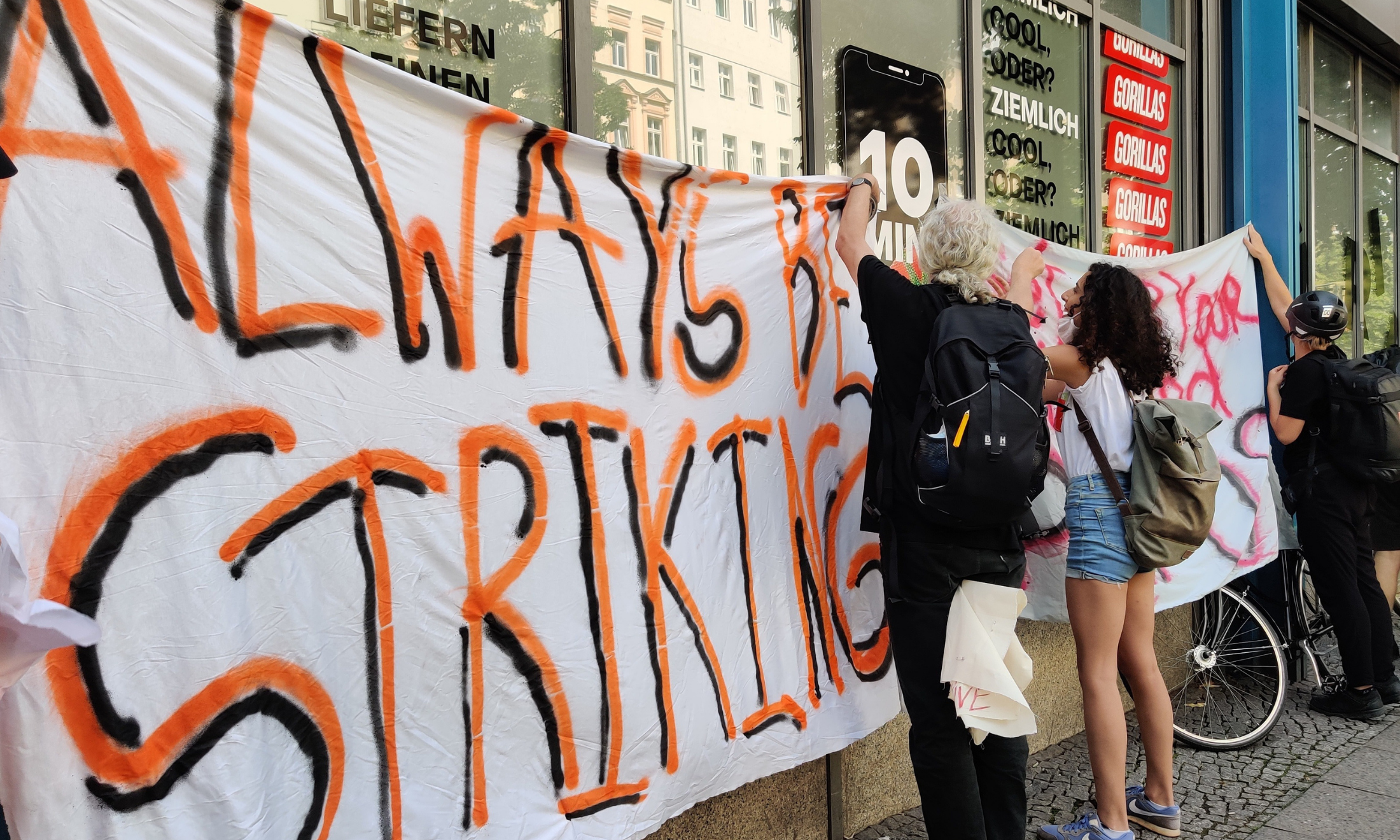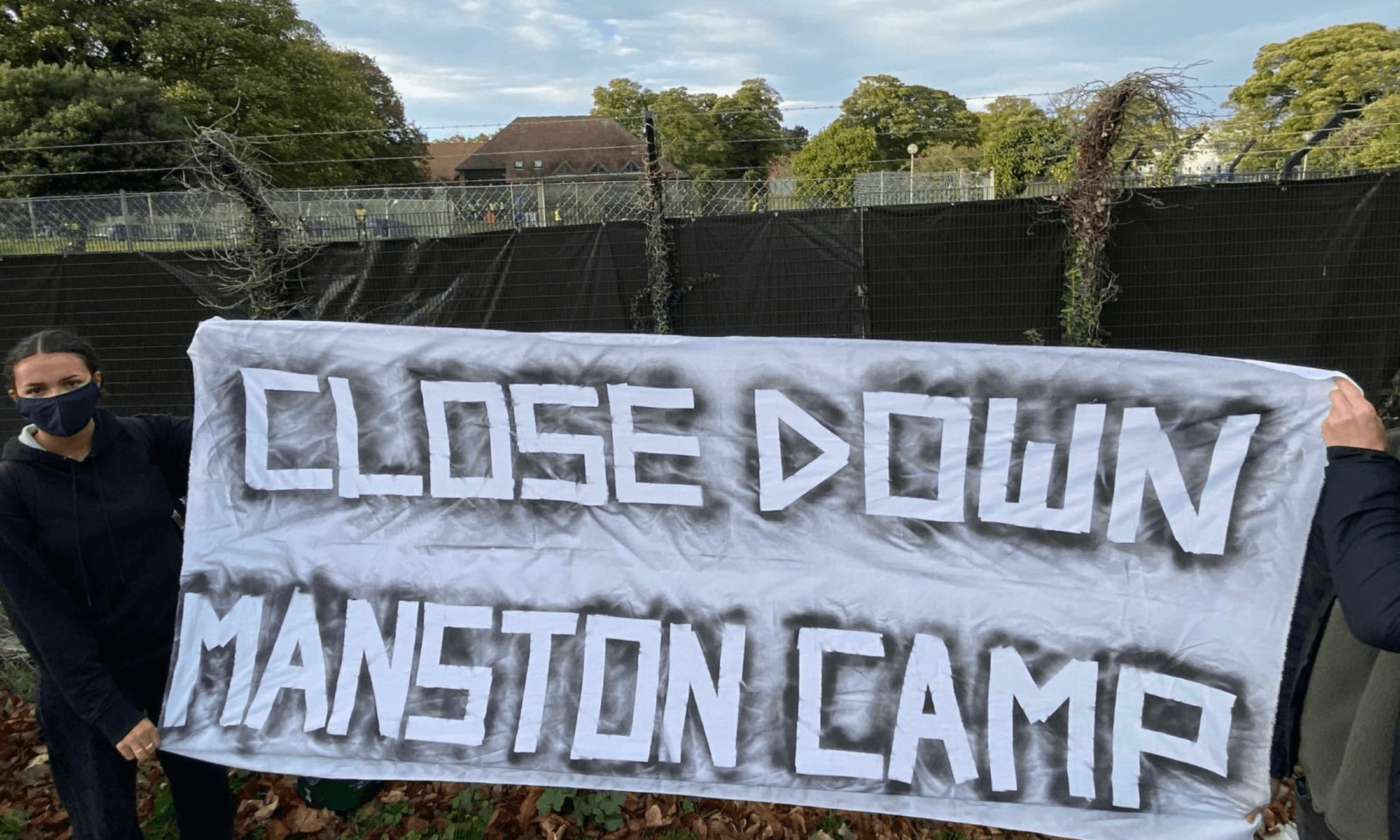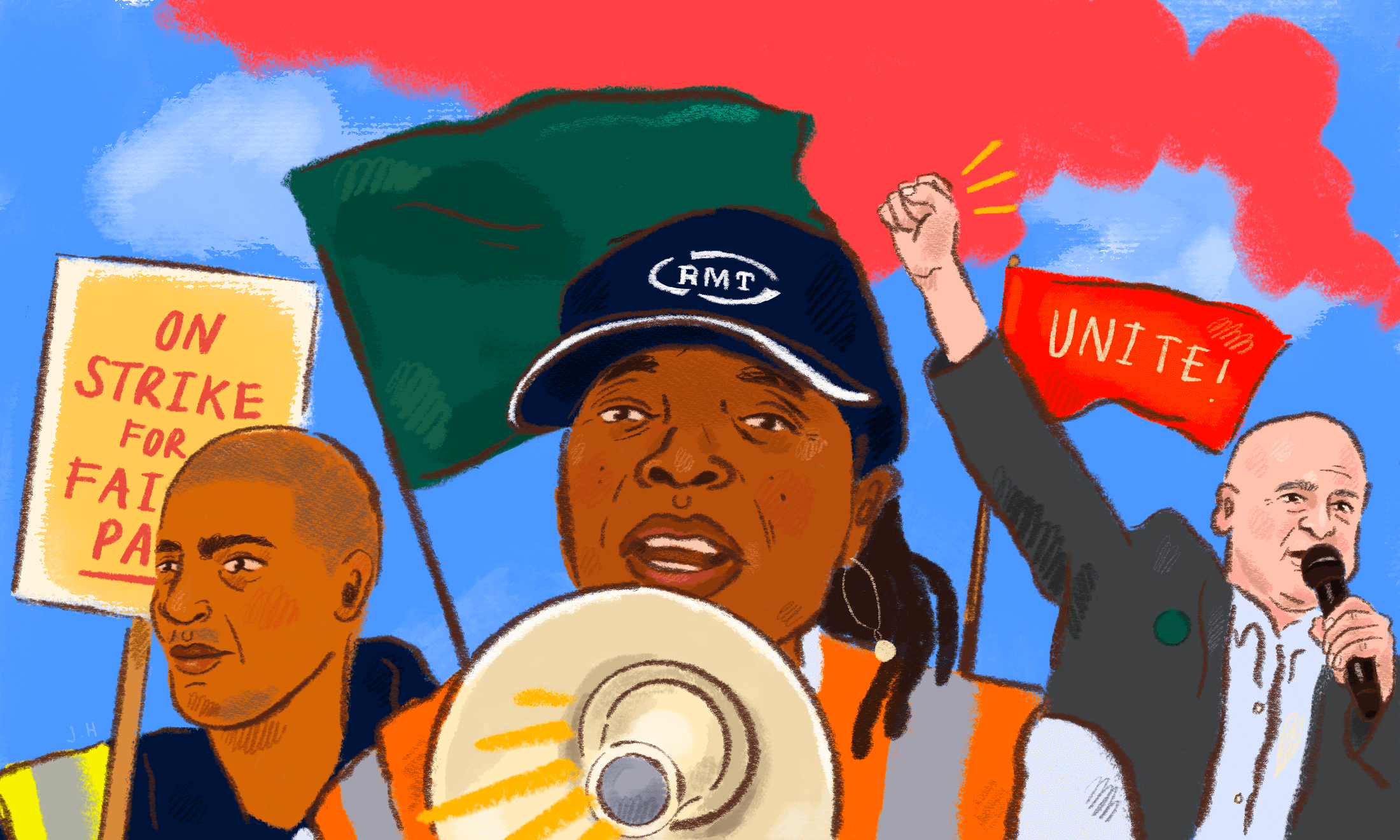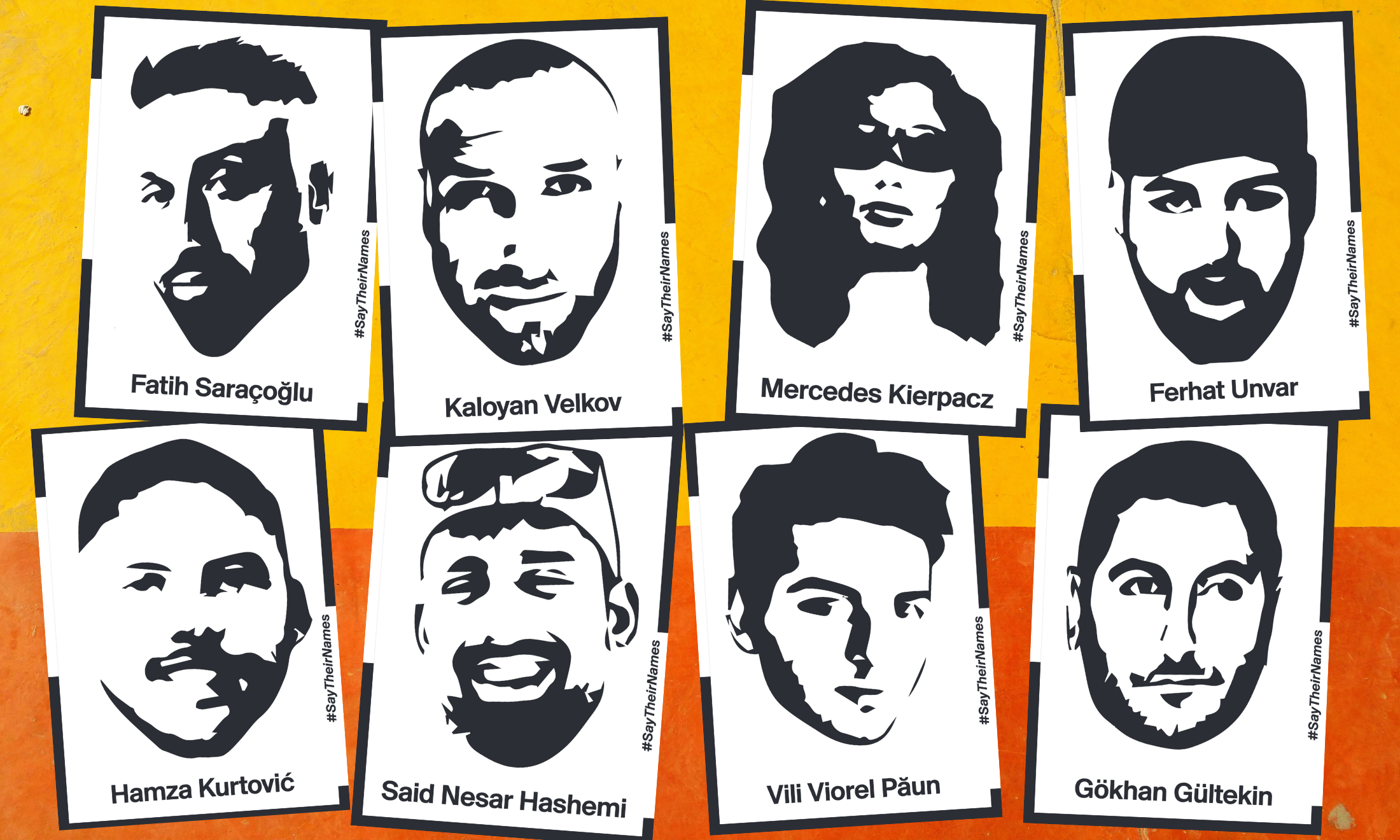How migrant riders for the Gorillas delivery start-up are re-igniting the fight for labour rights in Germany
In Berlin, riders for $1bn grocery delivery company Gorillas are downing their backpacks and are demanding change.
Asiya Ahmed
02 Aug 2021

Asiya Ahmed
A sunny July Saturday in Berlin. With lockdown finally lifted, chatter from outdoor cafés and restaurants fills the streets. But there’s another sound too; the persistent chime of dozens of bike bells ringing in tandem. The source of the noise? Riders for lauded grocery delivery startup Gorillas, who have chosen today for the next in a series of wildcat strikes, protesting dangerous – and poorly recompensed – working conditions. Today the action takes the form of a bike tour through Berlin, as convoys of riders, backs free of their normal heavy cargo, whizz to Gorillas supply warehouses across the city. Arriving at their destinations, riders hang banners from warehouse windows, bringing operations to a halt while chanting “Hey hey, ho ho, get organised and join the strike” in the hopes of inspiring new workers to get involved.
According to Zeynep Karlıdağ, a 23-year-old student from Turkey who works for Gorillas, company CEO Kağan Sümer said he would do a bike tour between warehouses to meet with fed-up riders. It never happened. So instead, frustrated with the lack of action from head office on their demands, workers launched their own tour. “[Sümer’s] slogan was #alwaysberiding,” says Zeynep. “Our slogan is #alwaysbestriking.”
Founded during the pandemic, Gorillas has enjoyed a meteoric rise. Just nine months after its launch in May 2020, it became Germany’s fastest start-up to reach ‘unicorn’ status, which sees a company valued at $1bn. The corporation has spread its tendrils across Europe and US, with its familiar black-and-white marketing campaigns lining city streets with promises to deliver groceries to your doorstep in the blink of an eye. But, like so many delivery start-ups, the company has gained widespread notoriety for poor working conditions, exposed by Berlin riders who have given up on months of worker-initiated feedback discussions and taken their struggle to the streets through public protest and strike action.
“Strikes are spreading from one warehouse to another because workers are fed up with the excuses, the postponements, the empty promises”
Zeynep Karlıdağ
Gorillas offers groceries to its customers at market price, with a pledged delivery time of only 10 minutes from the time an order is placed. Once an order is placed, Gorillas warehouse workers – called ‘pickers’ – prepare the items at the closest local warehouse before handing them over to one or more riders depending on how large the order is. The process is speedy, often at the rider’s risk – workers have reported they’re regularly made to carry illegally heavy loads on their backs. Despite its high-pressure model that puts riders under stress on the streets, the Gorillas manifesto proclaims the company is “rider-centric” and says its provision of contracts and insurance for riders sets it apart from other food delivery start-ups.
Though the bike tour was a first, the past five weeks has seen Gorillas riders down backpacks in the company’s Berlin warehouses. “Strikes are spreading from one warehouse to another because workers are fed up with the excuses, the postponements, the empty promises,” says Zeynep. “We want solutions.If we don’t keep up the momentum the company will think we are not serious – but no, we are serious.”
Convenience at a cost
Riders formed the Gorillas Workers Collective in February 2021, aiming to fight against unfair treatment and force the company to address the health and safety risks that riders face daily. Their aim is to reveal to customers and investors alike that the uber-convenient service comes at a much greater cost than the €1.80 delivery fee.
Behind the friendly face of the Gorillas service lies a grim reality. Riders who shared their stories with gal-dem cited a litany of mistreatment, including frequent accidents, chronic back pain, missing payslips, and sudden termination of employment .
Obstacles including racial discrimination and wrangles with visasmean migrant workers – often hailing from Argentina, Chile, Spain and Turkey – find the German job market difficult to navigate. And in the seasonal and gig work most often open to them, it’s common for migrants to find themselves up against precarious working conditions. Gorillas is not the only food delivery service where workers are taking on management; workers’ strikes have hit Deliveroo in the UK, UberEats across Latin America and in South Africa, and Bolt Food in Georgia.
Sitting at a local café in Friedrichshain where she lives, Gabriella Leyton, who moved from Chile to Berlin in December 2018, outlines the injuries she’s suffered while delivering for Gorillas. “The bikes are not suitable for these roads, and I was carrying a very heavy order and fell down because of the weight of my backpack while I was trying to make a turn,” she recalls of her first accident in March.
“In both instances, Gabriella missed out on chunks of her salary – amounting to around €300 – after the company failed to reimburse her sick pay in time for each month’s paycheck”
Since she started working for Gorillas in February 2021, Gabriella has endured two separate accidents. Both were a result of common grievances reported by riders – extremely heavy backpacks and obstacles like cobblestones, tram lines and weather conditions. She says her experience as a Gorillas rider went downhill following those incidents; her faith in the company is shaken. Now Gabriella feels increasingly insecure thanks to Gorillas response to her misfortune.
In both instances, Gabriella missed out on chunks of her salary – amounting to around €300 – after the company failed to reimburse her sick pay in time for each month’s paycheck. She is not alone. Many riders have called attention to Gorillas’ lags in processing sick leave payments – an anxiety-inducing practice for riders who fear not being able to pay their rent on time.
Gabriella describes her second accident in May 2021 as particularly rough. Injuries prevented her from working for 20 days and the delayed payment caused her significant monetary setbacks that month. It wasn’t just the financial strain that consumed Gabriella. Though she headed back to work, at first she was still concerned about the conditions known to cause many of the accidents. “I was really afraid to go back to the streets and start cycling again,” she says. “The equipment is not ready for the streets here”.
Gabriella and her colleagues point to faulty and improper equipment as a major cause for concern amongst riders. They have persistently flagged this issue to management; yet to this day, have not been met with satisfactory solutions to issues surrounding broken bikes and backpacks not designed for couriering purposes. These dangers, amongst other problems, led to riders creating an Instagram meme page called Gorillas Riders Life, where they share stories of their working life and satirise the company’s management.
Unsafe working conditions coupled with subpar equipment prompted riders to bring two warehouses in Pankow and Kreuzberg to a total shutdown on 30 June, as stormy rains hit Berlin. Once again, Gorillas did not have the necessary equipment to provide to its riders.
Crackdowns from the top
Organising has not come without retaliation from Gorillas’ top brass. While riders were in the middle of setting up a workers’ council (hosting elections on 3 June, which management attempted to crash), the current wave of labour activism did not begin until the abrupt firing of Santiago Rojas – a rider from Argentina – on 9 June. Gorilla cited “serious misconduct” as the reasoning for Rojas’ termination. Fellow employees allege that it was actually because he was late to work one morning – and had texted a manager in advance to let them know.
Gorillas places riders on contracts with a probation period that meets the German legal limit of six months. During those six months, riders can be fired at any time without justification and with only two-weeks notice. This lengthy probation period places riders in an uncertain and financially risky situation, which is particularly unsettling for migrant workers who have less employment options available than their German counterparts.
“It’s deeper than just work security, there’s discrimination in housing and other [areas] period,” says South Asian-American former Gorillas rider Sarah Alikhan. “It’s [about] overall discrimination in Germany that isn’t talked about as much as it should be.”
Santiago Rojas’ sudden termination sparked an outpouring of solidarity from fellow riders at other warehouses, who showed up en masse to the Checkpoint Charlie packing location to demand his reinstatement. Zeynep recalls how workers stood firmly in front of warehouse managers and delivered an ultimatum: management could either reverse the decision to fire Santiago, or face more strikes. Gorillas did not reinstate Santiago. As a consequence, workers blocked operations warehouses in Berlin-Mitte, Prenzlauerberg and Kreuzberg between 9 and 11 June.
“Germany’s striking workers six decades ago were resisting the same forms of exploitation as the Gorillas riders striking today.”
This action ultimately caught the attention of management. “Finally [Gorillas] heard us,” says Zeynep, “They realised we have problems, even though we were trying to solve them from the beginning.”
Some members of the workers’ collective believe migrant riders face specifically harsh working conditions because of their background and a misconception that they are temporary workers in Germany – especially migrant riders of colour. These specific struggles faced by migrant workers and the exploitative working conditions at Gorillas are the reasons the collective formed. Workers have come to understand that Gorillas’ wild financial success has come off the back of not only their labour, but their pain and suffering.
During a protest on 28 June, workers delivered a list of 19 demands to management with a deadline for them to be met by 14 July. In the meantime, management began terminating a number of migrant riders without notice from 8 July, even though these workers passed their probation and held letters from the immigration office permitting them to continue working until their upcoming meetings with the authorities.
An organising legacy
Striking Gorillas migrant workers are part of a rich history of labour activism in Germany. Increased migration into Germany began after World War II as part of ‘guest worker’ agreements through which foreign workers helped rebuild the country. In 1955, Italy was the first to sign an agreement to send temporary workers into Germany, but soon after workers arrived from Spain, Greece, Morocco, South Korea, Portugal, Tunisia, Yugoslavia and, crucially, from Turkey. With this migration came a wave of labour activism.
Little known among these are the wildcat strikes of the late 1960s and early 1970s, many of which were catalysed by ‘guest workers’ in west Germany. Thousands of workers participated in strikes that stretched across industries from steel and metal, to textiles and mining.
Fighting against issues including low wages, unsafe working conditions and the unreasonable speed at which workers were expected to complete their tasks, Germany’s striking workers six decades ago were resisting the same forms of exploitation as the Gorillas riders striking today.
“Through their activism, guest workers created a different future for themselves in Germany by demonstrating political consciousness,” writes researcher Jennifer Miller on the impact of the strikes. According to Miller, the actions not only addressed the temporary concerns of workers in specific workplaces, but also signalled to German society that migrant workers were there to stay.
As the Gorillas migrant riders in Berlin reignite a tradition of wildcat strikes in Germany, they’re inspiring fellow Gorillas riders abroad. Rebecca Lee*, a Gorillas rider in London, sees the Berlin strikes as a catalyst for the company’s workers beyond Germany to begin organising and taking action. “For us in London, it’s giving us hope, it’s legitimising the grievances we have here,” she says.
After the conclusion of the most recent round of strikes on 17 July, Zeynep addressed her fellow workers, assuring them the actions would continue if working conditions didn’t improve. “If the company does not meet our demands, these actions will only get bigger,” she told the assembled crowd. As the faces of the company and the engine powering its business-model, these riders know that once united, the real might of Gorillas lies with them.
From Berlin to London to Los Angeles and beyond, the battle against exploitation in the bike-led food delivery economy has seen workers rise up and fight back against unsafe working conditions. “It doesn’t matter how tired we are,” says Zeynep of moving forward. “We just want our basic rights and we will do everything for them.”
*Name has been changed to protect identities
This article was updated on 2 August 2021 to reflect the fact Santiago Rojas is from Argentina, not Chile.





